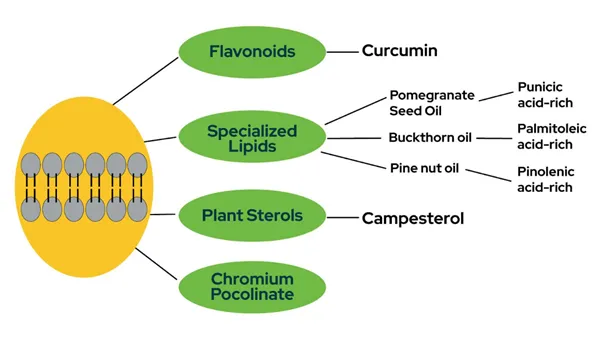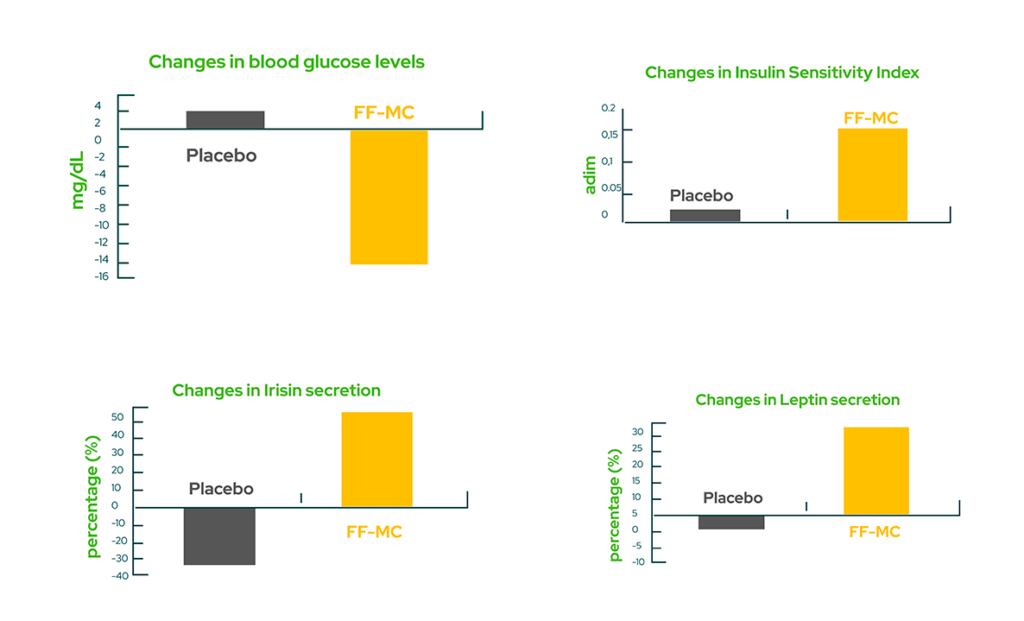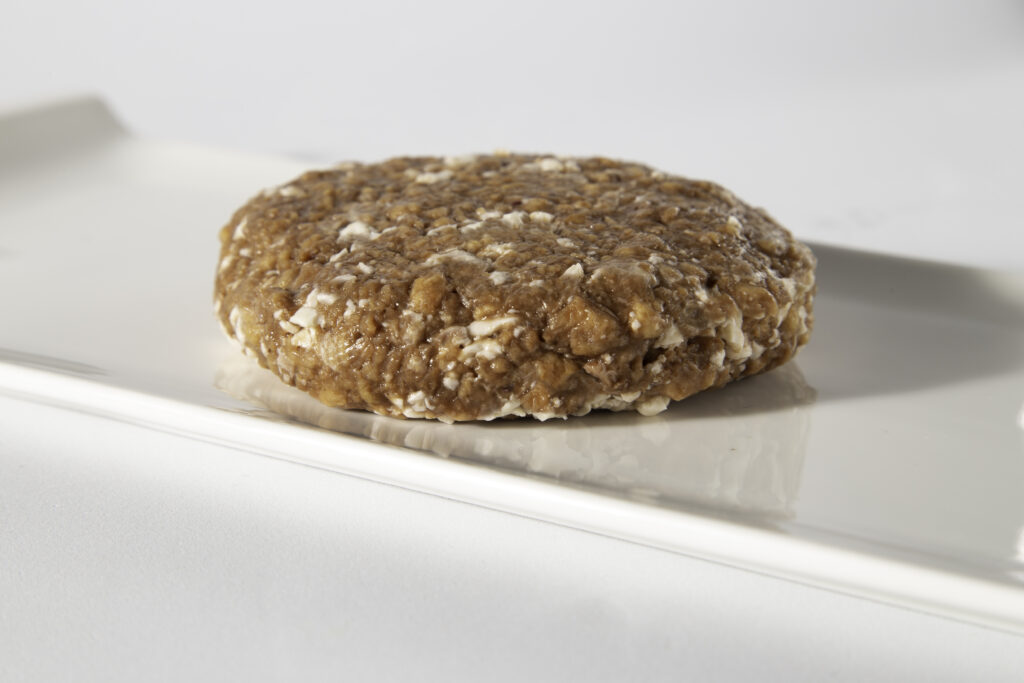
Unlocking the Power of Vegetable Functional Fats:
The global obesity crisis has put metabolism in the spotlight. Fueled by growing consumer interest in GLP-1 agonists and a rising understanding of the role of inflammation, food and nutrition companies are seeking new ways to improve metabolic health. Functional vegetable fats are emerging as a powerful tool in this effort, offering a natural and effective way to promote optimal health.1
Fats are fundamental for our body to function properly, and new research suggests that functional fats, a unique type of plant-derived lipids, may offer a variety of potential health benefits, including:
- Support Cell Membrane Integrity2
- Provide Anti-Inflammatory Effects3
- Energy Production4
- Contribute to regulate Hormones5
- Support Brain and Nervous System6
- Enable Fat Soluble Vitamin Absorption7
- Lipid Metabolism 8
- Help Against Oxidative Stress9
The Future of Metabolic Support: Alianza Team's Study
Leveraging over 75 years of expertise in lipid formulation, scientists at Alianza Team conducted a clinical study aimed at metabolic control. The study investigated a unique blend combining polyunsaturated fatty acids, trace elements, polyphenols, and plant sterols designed to work together to contribute to metabolic health (Pélaez et al, 2019). The rationale for the unique combination is shown below.

- Polyphenols have antioxidant properties.10
- Punicic acid, a unique conjugated linolenic acid (CLA) found in pomegranate seed oil, not only functions as an antioxidant but also has been linked to positive effects on fat metabolism.11 12
- Palmitoleic acid, a monounsaturated fatty acid with key signaling roles, shows promise in reducing the risk of type 2 diabetes and hypertriglyceridemia. Research involving both animal and human subjects supports its positive impact on improving plasma triglyceride, LDL, and HDL cholesterol levels.13 14 15
- Pinolenic acid, an isomer of gamma-linolenic acid, has been shown to significantly increase appetite-suppressing hormones GLP-1 and CCK-8.16
- Chromium, a trace element, plays a key role in insulin signaling and may improve insulin sensitivity. Studies in newly diagnosed type 2 diabetes patients showed that chromium supplementation significantly reduced plasma glucose and HbA1c levels while positively affecting plasma lipids.17 18
- Plant sterols block the absorption of cholesterol in the intestines, which can help lower serum cholesterol levels and improve cardiovascular health.19
Overall, these compounds offer promising benefits for the consumers’ well-being.


Our Unique Blend: A Clinically Tested Formulation
To evaluate the effectiveness of this new formulation, Alianza Team conducted a clinical study involving 25 patients with pre-existing metabolic conditions. The participants were split into three groups: a control group and two treatment groups receiving either a low or high-dose of our unique blend. The treatment groups were administered the product daily, with instructions to maintain their usual diet and exercise routines. The complete study can be found at NCBI20. The study yielded promising results, demonstrating that the high-dose group experienced improvements in several key metabolic health markers, including insulin sensitivity, glucose tolerance, body fat distribution, inflammation levels, and hormone regulation.
Specific improvement in biomarkers in the high-dose group versus the controls included:
- Reduction in pre-diabetes parameters, including AST enzymes, by up to 7 times
- Elevation of plasma irisin (a key myokine)
- Reductions in hsCRP
- Elevations of GLP-1
Some of the markers are illustrated on the charts below.

We observed favorable changes in insulin sensitivity, glucose tolerance, body fat distribution and inflammation, but these effects and their durability will need to be assessed more extensively in future studies.
Partner with Alianza Team to Pioneer the Future of Health & Wellness through Vegetable Functional Fats-Based Innovation: FF-MC, a New Ingredient Technology.
Backed by extensive scientific understanding and experience, Alianza Team partners with you to develop cutting-edge products that promote well-being. Our robust prototyping and shelf-life testing guarantee high-quality, flavor-rich solutions that resonate with your target audience.
That is how we developed our functional fat product called FF-MC*. It contains the ingredients from our study.

“For a few decades, the scientific community has been vilifying fats, only to realize how critical the right fats are for health. The movement to functional fats represents a paradigm shift in our ability to contribute to wellbeing. There is an art to lipid formulations, and the unique blend combines the best of the science with their skillful blend of bioactive ingredients. Looking at the studies 20, there was efficacy at 7g of product, which makes the unique blend ideal for inclusion in powders, bars and liquids. Alianza Team has cracked a new way of delivering benefits through food» notes personalized nutrition expert Mark Tager, MD, CEO of ChangeWell Inc.
Our expertise in crafting ingredients with vegetable functional fats allows us to guide you in developing products that truly benefit consumers. Together, we create a healthier future through science and nutrition.
These sentiments are echoed by Tom Aarts, CEO of Nutrition Business Advisors and creator of the NBJ Summit. According to Aarts,«We constantly need more natural and efficacious formulations for the nutraceutical industry and fats are a really good source to turn to. In the end approximately 60% of our brains are fat. We have to learn how to embrace these critical substances and begin incorporating them intelligently into functional foods.»
Unlock the potential of your products with our expertise. Contact Alianza Team to explore the possibilities.
For further insights, explore our publication: “Impact of a Formulation Containing Unusual Polyunsaturated Fatty Acids, Trace Elements, Polyphenols and Plant Sterols on Insulin Resistance and Associated Disturbances, 2020”.
References
*Patent pending.
1 Botella-Martínez, C., Pérez-Álvarez, J. Á., Sayas-Barberá, E., Navarro Rodríguez de Vera, C., Fernández-López, J., & Viuda-Martos, M. (2023). Healthier oils: A new scope in the development of functional meat and dairy products: A review. Biomolecules, 13(5), 778.
2 (Vvedenskaya, n.d.) Dietary fatty acids influence the cell membrane. https://www.lipotype.com/. Retrieved September 20, 2024, from https://www.lipotype.com/lipidomics-applications/dietary-fatty-acids-influence-the-cell-membrane/
3 (Coniglio et al, 2023) Coniglio, S., Shumskaya, M., & Vassiliou, E. (2023). Unsaturated Fatty Acids and Their Immunomodulatory Properties. Biology, 12, 17.
4 (Bhupathiraju & Hu, 2023) Carbohydrates, Proteins, and Fats – Carbohydrates, Proteins, and Fats – MSD Manual Consumer Version. MSD Manuals. Retrieved September 20, 2024, from https://www.msdmanuals.com/home/disorders-of-nutrition/overview-of-nutrition/carbohydrates-proteins-and-fats#Proteins_v60557901
5 (Bhathena, 2006) Relationship between fatty acids and the endocrine and neuroendocrine system. Nutritional Neuroscience, 9, 1-10.
6 (Dighriri et al, 2022) Effects of Omega-3 Polyunsaturated Fatty Acids on Brain Functions: A Systematic Review. Cureus, 14, 1-10.
7 (NHS, 2023) Facts about fat. https://www.nhs.uk/. Retrieved September 20, 2024, from https://www.nhs.uk/live-well/eat-well/food-types/different-fats-nutrition/
Pélaez, M. and others 14 (2019). Impact of a Formulation Containing Unusual Polyunsaturated Fatty Acids, Trace Elements, Polyphenols and Plant Sterols on Insulin Resistance and Associated Disturbances. Diabetes Therapy, 11, 229-245.
8 (Eichelmann et al, 2024)Eichelmann, F. and others 19 (2024). Lipidome changes due to improved dietary fat quality inform cardiometabolic risk reduction and precision nutrition. Nature Medicine, 1-32.
9 (Adekar et al, 2016) Adekar, S. P., Farooqui, A., & Farooqui, T. (2016). Prevention of Oxidative Stress by Omega-3 Fatty Acids in the Brain. In M. V. Hegde & A. A. Zanwar (Eds.), Omega-3 Fatty Acids: Keys to Nutritional Health (pp. 239-249). Springer International Publishing.
10 Shabbir MA, Khan MR, Saeed M, Pasha I, Khalil AA, Siraj N. Punicic acid: a striking health substance to combat metabolic syndromes in humans. Lipids Health Dis. 2017;16:99.
11 Arao K, Wang Y, Inoue N, et al. Dietary effect of pomegranate seed oil rich in 9cis, 11trans, 13cis conjugated linolenic acid on lipid metabolism in obese, hyperlipidemic OLETF rats. Lipids Health Dis. 2004;3:24–30.
12 Cao H, Gerhold K, Mayers JR, Wiest MM, Watkins SM, Hotamisligil GS. Identification of a lipokine, a lipid hormone linking adipose tissue to systemic metabolism. Cell. 2008;134:933–44.
13 Mozaffarian D, Cao H, King IB, et al. Trans-palmitoleic acid, metabolic risk factors, and new-onset diabetes in US adults: a cohort study. Ann Intern Med. 2010;153:790–9.
14 Bernstein AM, Roizen MF, Martinez L. Purified palmitoleic acid for the reduction of high-sensitivity C-reactive protein and serum lipids: a double blinded, randomized, placebo controlled study. J Clin Lipidol. 2014;8:612–7.
15 Pasman WJ, Heimerikx J, Rubingh CM, et al. The effect of Korean pine nut oil on in vitro CCK release, on appetite sensations and on gut hormones in post-menopausal overweight women. Lipids Health Dis. 2008;7:10.
16 Sharma S, Agrawal RP, Choudhary M, Jain S, Goyal S, Agarwal V. Beneficial effect of chromium supplementation on glucose, HbA1C and lipid variables in individuals with newly onset type-2 diabetes. J Trace Elem Med Biol. 2011;25:149–53.
17 Ali A, Ma Y, Reynolds J, Wise JP Sr, Inzucchi SE, Katz DL. Chromium effects on glucose tolerance and insulin sensitivity in persons at risk for diabetes mellitus. Endocr Pract. 2011;17:16–25.
18 Rondanelli M, Monteferrario F, Faliva MA, Perna S, Antoniello N. Key points for maximum effectiveness and safety for cholesterol-lowering properties of plant sterols and use in the treatment of metabolic syndrome. J Sci Food Agric. 2013;93:2605–10.
Latest news

Revolutionising Plant-Based Meat Alternatives: The Game-Changing Impact of MirrorTissue

Unlocking the Power of Vegetable Functional Fats: Metabolic Support in an ERA of GLP-1

How tailored lipid solutions can overcome the production challenges of dairy analogs

MOSH and MOAH Control: Ensuring Food Safety through High-Impact Strategies

Trends in the consumption of functional drinks and infant formulas in the United States

BlueLife: This is how we achieve recycling water that is suitable for life

Is it possible to impact sodium and saturated fats through lipids?

Revolutionizing bakery: Unlocking the potential of Oleogels for texture, wellbeing and sustainability
